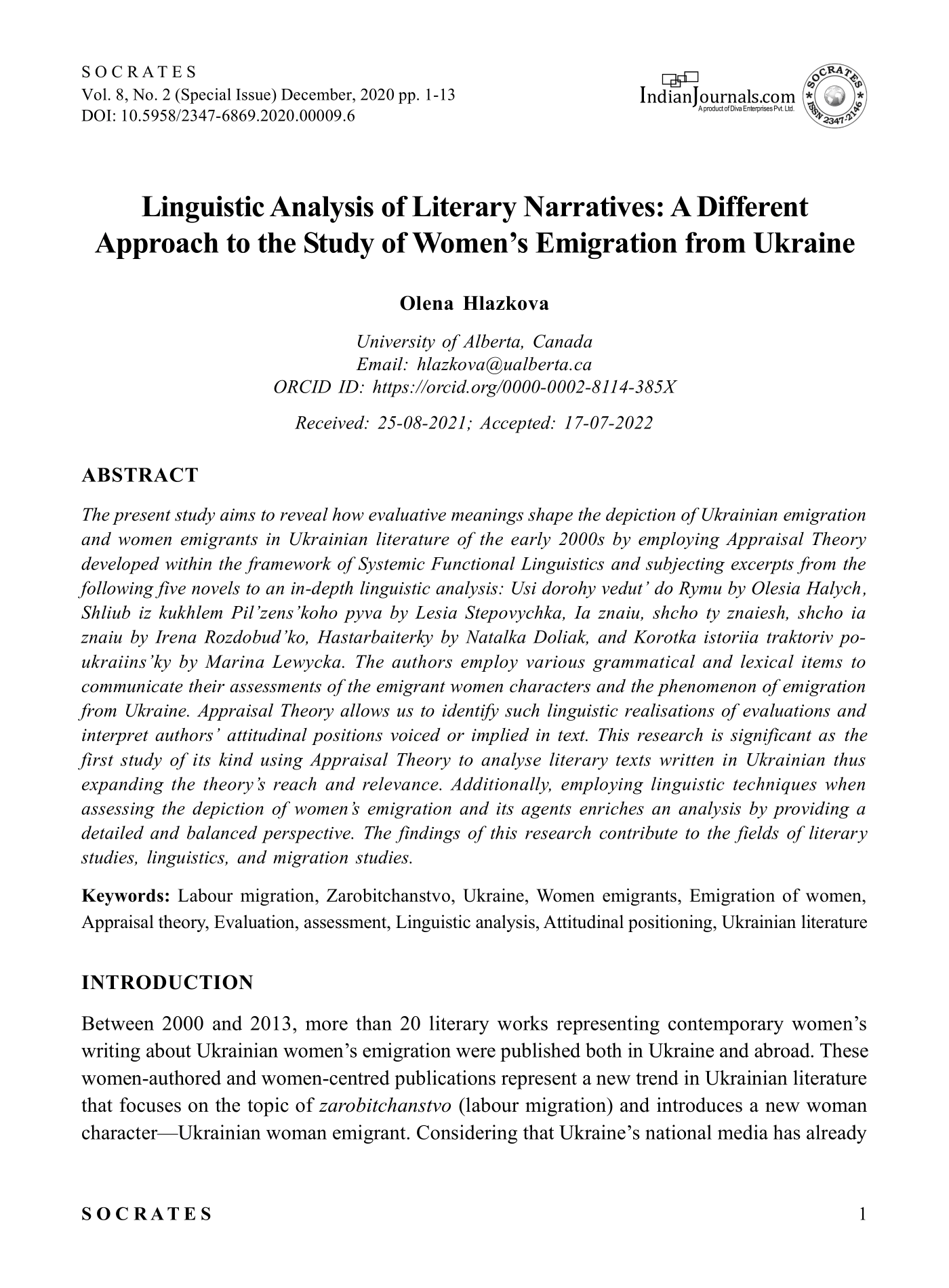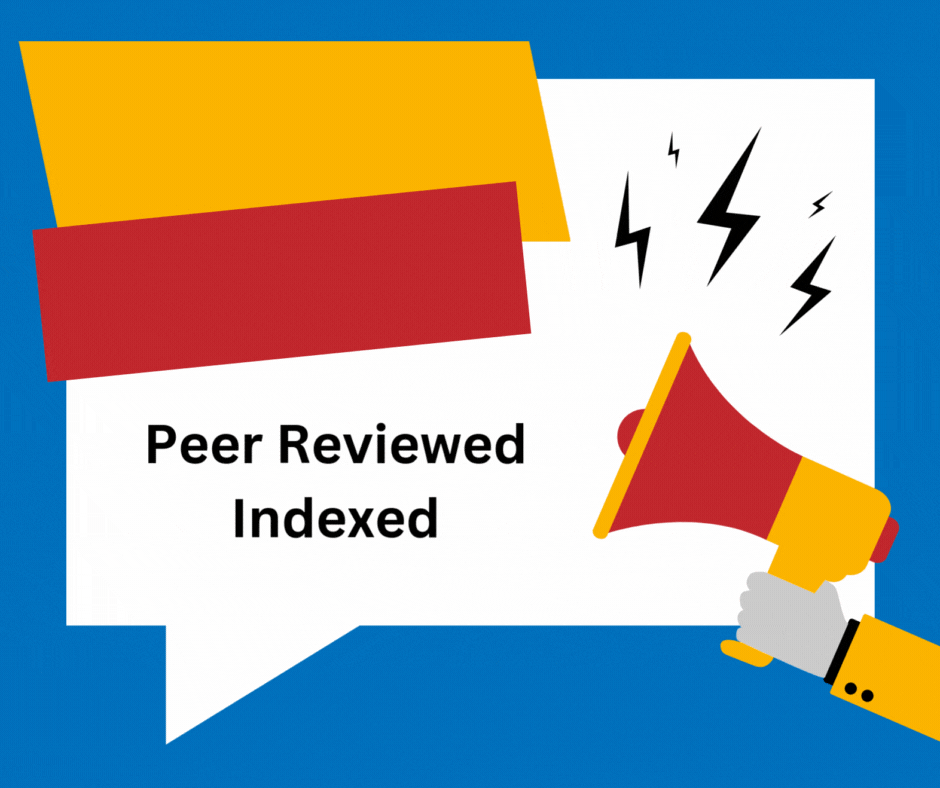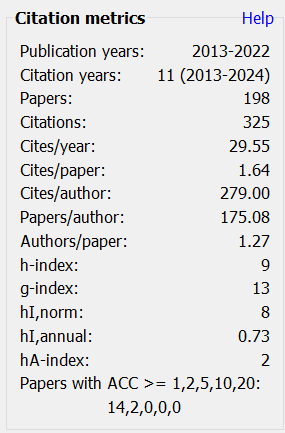Linguistic Analysis of Literary Narratives
A Different Approach to the Study of Women’s Emigration from Ukraine
DOI:
https://doi.org/10.5958/2347-6869.2020.00009.6Keywords:
labour migration, zarobitchanstvo, Ukraine, women emigrants, emigration of women, appraisal theory, evaluation, assessment, linguistic analysis, attitudinal positioning, Ukrainian literatureAbstract
The present study aims to reveal how evaluative meanings shape the depiction of Ukrainian emigration and women emigrants in Ukrainian literature of the early 2000s by employing Appraisal Theory developed within the framework of Systemic Functional Linguistics and subjecting excerpts from the following five novels to an in-depth linguistic analysis: Usi dorohy vedut’ do Rymu by Olesia Halych, Shliub iz kukhlem Pil’zens’koho pyva by Lesia Stepovychka, Ia znaiu, shcho ty znaiesh, shcho is znaiu by Irena Rozdobud’ko, Hastarbaiterky by Natalka Doliak, and Korotka istoriia traktoriv poukraiins’ky by Marina Lewycka. The authors employ various grammatical and lexical items to communicate their assessments of the emigrant women characters and the phenomenon of emigration from Ukraine. Appraisal Theory allows us to identify such linguistic realisations of evaluations and interpret authors’ attitudinal positions voiced or implied in text. This research is significant as the first study of its kind using Appraisal Theory to analyse literary texts written in Ukrainian thus expanding the theory’s reach and relevance. Additionally, employing linguistic techniques when assessing the depiction of women’s emigration and its agents enriches an analysis by providing a detailed and balanced perspective. The findings of this research contribute to the fields of literary studies, linguistics, and migration studies.
Downloads
Metrics
References
Doliak, N. (2012). Hastarbaiterky. Kharkiv: Klub Simeinoho Dozvillia.
Halych, O. (2004). Usi dorohy vedut’ do Rymu: povist’-ese za frahmentamy shchodennyka zarobitchanky.Ternopil’: Dzhura.
Khymovych, O. (2008). Emihratsiina aktyvnist’ zhinochoho naselennia v Ukraini. Visnyk L’vivs’koho Universytetu, 2, 362-366.
Lewycka, M. (2013). A Short History of Tractors in Ukrainian. Kyiv: Tempora.
Martin, J. R., & White, P. R. (2005). The language of evaluation: Appraisal in English. Basingstoke: Palgrave Macmillan.
Pribytkova, I. (2002). Trudovi mihranty u sotsial’nii iierarkhii ukrains’koho suspil’stva: Statusni pozytsii, tsinnosti, zhyttievi stratehii, styl’ i sposib zhyttia. Sotsiolohiia: Teoriia, Metody, Marketynh, 4,156-167.
Rozdobud’ko, I. (2011). Ia znaiu, shcho ty znaiesh, shcho ia znaiu: Roman. Kyiv: Nora-Druk.
Stepovychka, L. (2007). Shliub iz kukhlem Pil’zens’koho pyva. Dnipropetrovs’k: Lira.
Tsymbal, T. (2012). Fenomen emihratsii: Dosvid filosovs’koi refleksii (Master’s thesis, Kyiv - Kryvyi Rih, 2012) (pp. 1-396). Kyiv - Kryvyi Rih: Vydavnychyi Dim.
Volod’ko, V. (2007). Reprezentatsiia suchasnoi ukrains’koi trudovoi mihratsii v presi. Ukrains’kyi Sotsium, 2, 90-101.
White, P. R. (2015). Attitude/Judgement 1. Retrieved March 9, 2021, from https://www.grammatics.com/appraisal/appraisalguide/framed/stage2-attitude-judgement.htm
White, P. R. (2015). Retrieved March 9, 2021, from https://www.grammatics.com/appraisal/appraisalguide/framed/stage3-attitude-appreciation.htm#TopOfPage

Downloads
Published
How to Cite
Issue
Section
Categories
License
Copyright (c) 2022 Olena Hlazkova (Author)

This work is licensed under a Creative Commons Attribution-NonCommercial 4.0 International License.
Revised Copyright/CC license that applies to all the articles published after 05-02-2017
Attribution-NonCommercial 4.0 International (CC BY-NC 4.0)

Copyright/CC license that applies to all the articles published before 05-02-2017
Attribution-Non Commercial-No Derivatives 4.0 International (CC BY-NC-ND 4.0)

Author(s) will retain all the right except commercial and re-publishing rights. In the case of re-publishing, they will have to obtain written permission from the journal. Additional licensing agreements (Creative Commons licenses) grants rights to readers to copy, distribute, display and perform the work as long as you give the original author(s) credit, they can not use the works for commercial purposes and are not allowed to alter, transform, or build upon the work. For any reuse or distribution, readers and users must make clear to others the license terms of this work. Any of these conditions can be waived if you get permission from the copyright holders. Nothing in this license impairs or restricts the authors’ rights. To view a copy of this license, visit http://creativecommons.org/licenses/by-nc-nd/4.0/ or send a letter to Creative Commons, 171 Second Street, Suite 300, San Francisco, California, 94105, USA.
Research Papers published in SOCRATES are licensed under an Attribution-NonCommercial-NoDerivatives 4.0 International (CC BY-NC-ND 4.0)
















